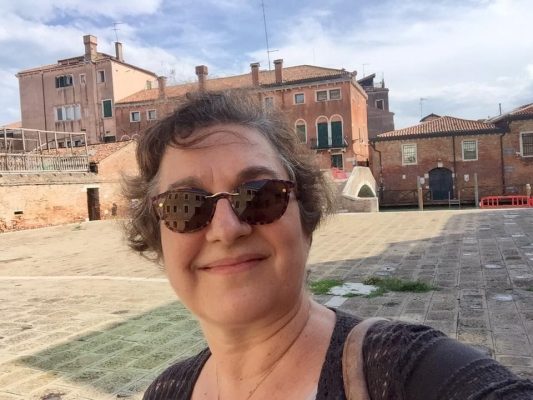Stavreva releases several pieces on latest Shakespeare research
Professor of English Kirilka Stavreva’s latest research highlights new ways of thinking about how Shakespeare’s works impact individuals and communities.

Her findings will continue to shape how she teaches Shakspeare at Cornell College.
“When most people think about Shakespeare and performance, they usually think of commercial theatre or summer theatre festivals–there’s nothing wrong with that–but my recent research has focused on Shakespeare beyond the entertainment value and beyond, strictly speaking, the literary value. It allows me to get students to think about Shakespeare as creating, healing, and sustaining individuals and communities.”
Stavreva’s latest research has been printed in a variety of scholarly venues.
“Refracting the racial Other into the Other-within in two Bulgarian adaptations of ‘Othello,’” an article authored by Stavreva and Boika Sokolova, was published by Arden Shakespeare in the 2021 essay collection, “Shakespeare’s Others in 21st-Century European Performance.”
In the article, the authors examine how “others,” or those marginalized by societal norms, are portrayed differently in three productions of “Othello.”
“The article shows how otherness can be translated from one context into another without erasing its original meaning,” Stavreva said. “So when a theatre production in a country without a colonial legacy translates the otherness of race in ‘Othello’ as the otherness of gender, or that of social outcasts, or of politically suspect intellectuals, all of these categories get intertwined with each other. Each of them provides a historical depth and a range of meaning that otherwise is oftentimes not there.”
“From a schoolyard play to civic festival: Shakespeare in the Bulgarian village of Patalenitsa,” came out in January of 2022 in another Arden Shakespeare collection of essays titled “Shakespeare on European Festival Stages.”
The article, also co-authored by Boika Sokolova, examines how a village started a now well-known Shakespeare festival in post-Communist Bulgaria. What began as a children’s summer production has transformed into a small-scale Shakespeare festival and summer school for young actors, involving international actors and directors, and attracting audiences from across the country.
Stavreva says this festival hasn’t been written about before for an international audience, and she was honored to share the story. Stavreva saw “A Midsummer Night’s Dream” in Patalenitsa in 2019, the 20th anniversary of the festival, and met the general manager, director, townspeople, and actors who create the festival on a shoestring budget on a stage in a schoolyard under the stars. She says it was one of the most amazing experiences in her life.

“The story of Patalenitsa Shakespeare is a story about the altruism of its pioneers–a theatre family and an elementary school principal–and the altruism of young and established actors and directors from Bulgaria and more recently, the United Kingdom,” Stavreva said. “None of them are paid, but they gather in this small village summer after summer–an artistic colony open to talented local youth whose intensive workshops and rehearsals in the shady schoolyard share the space of regular village life. They have changed the lives of individuals and the community permanently. This forgotten village is now on the theatre map of Bulgaria–and thanks to the collection, on the theatre map of Europe too.”
Stavreva has also published three dialogic research pieces for which she conducted conversations with directors and actors on a variety of topics, including Stephan Wolfert, founder of De-Cruit, a Shakespeare theatre therapy project for U.S. veterans. Wolfert co-taught an online course at Cornell with Stavreva during Block 8 of 2021.
“The conversation with Stephan was about healing and voicing, through Shakespeare, the stories of the traumas that veterans carry and about creating a community of people who so easily get forgotten and become invisible once they come home,” Stavreva said.
This piece, published online first, appears in a special issue of the international journal Cahiers Élisabéthains, “Shakespeare and European Geographies: Centralities and Elsewheres.”
Stavreva says the publication of these discussions is important for Shakespeare research.
“These conversations don’t happen often and such dialogues are certainly not the kind of work that gets published in academic venues,” Stavreva said. “In this respect it’s innovative. All three of these collaborative pieces breach the perceived and sometimes very real divide between scholars and theatre practitioners, which is something that is important to me and informs my ‘regular’ scholarship as well.”
Stavreva isn’t stopping here. With Boika Sokolova, she has completed a book on key performances of “The Merchant of Venice.” That’s slated to get published in 2023 by Manchester University Press.
Stavreva started teaching at Cornell College in 2001. Born and raised in Bulgaria, Stavreva completed a Ph.D. in early modern English literature at the University of Iowa, and after a brief detour for a postdoctoral position at the Folger Shakespeare Library in Washington, D.C., put down academic roots in Iowa. Stavreva served as the Richard and Norma Small Distinguished Professor from 2017 to 2019 and was awarded a Fulbright Global Flex Award in 2016 to conduct Shakespeare performance research in Italy and England.



